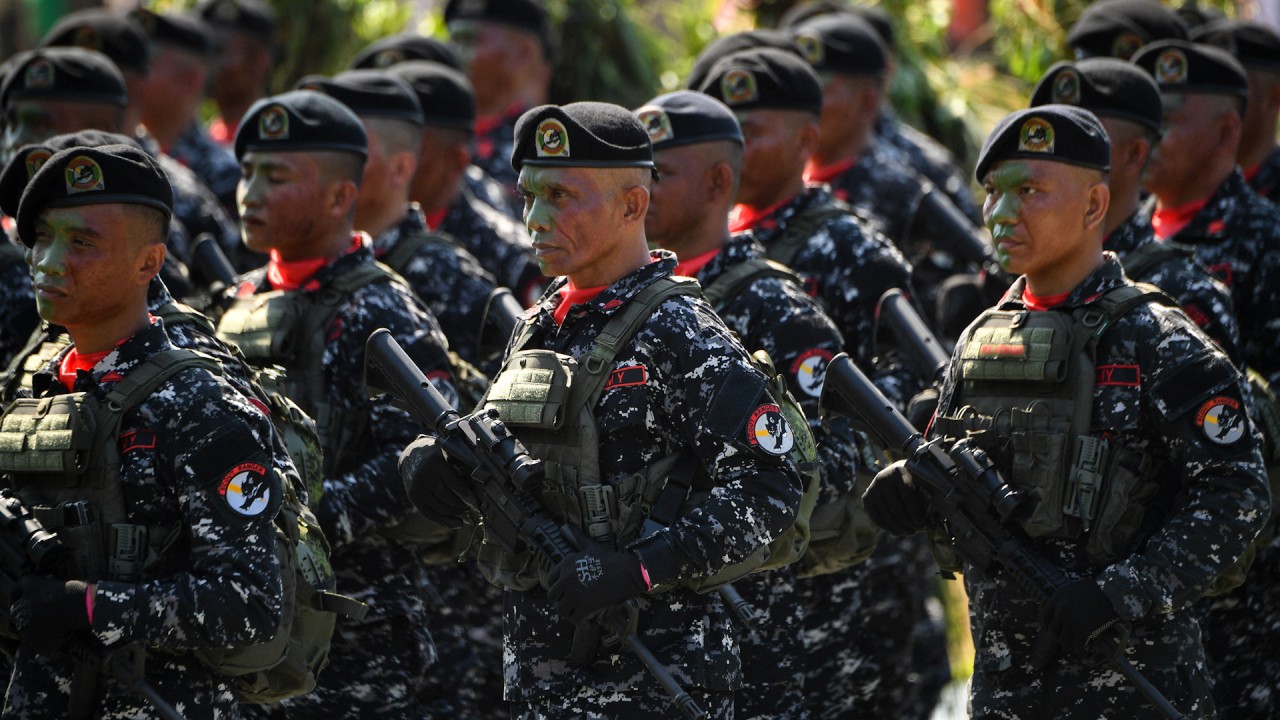China-Asean ties: 6-nation military drills reveal Beijing’s relationship goals with Southeast Asian neighbours
According to a PLA Daily report on Monday, the Chinese military’s official newspaper, the exercise takes place in Zhanjiang, Guangdong province, in southern China – the first time Aman Youyi has been held in Chinese territory.
South China Sea skirmishes loom over Asean defence ministers’ meeting
South China Sea skirmishes loom over Asean defence ministers’ meeting
The newspaper said the six countries aimed to enhance urban and maritime anti-terrorism and anti-piracy capabilities, to further deepen “mutual trust and pragmatic cooperation” among their militaries to jointly safeguard regional peace and stability and “strengthen multidimensional, multi-link three-dimensional anti-terrorism strike forces”.
The joint drill introduced reconnaissance equipment such as portable drones and wall-penetrating radar to anti-terrorism operations to “accurately obtain target information and guide precise strikes and destruction of various targets”, according to the PLA Daily.
It quoted a Chinese staff officer involved in planning the exercises saying the exercises and training helped Beijing understand the training concepts and methods of other countries to help the PLA improve.
Collin Koh, a senior fellow at the S. Rajaratnam School of International Studies in Singapore, said the drills’ focus on “low hanging fruit”, such as non-traditional maritime security and counterterrorism, was chosen to avoid sensitive matters considering that Malaysia and Vietnam were co-claimants in the South China Sea.
“For China, this exercise is one way for it to ‘play catch-up’ with much better established extra-regional actors which have maintained decades-old, deeper and broader … joint military activities with Southeast Asian countries, such as the US,” Koh said.
“Aman Youyi is at best considered one of the nascent steps towards deepening Beijing’s defence diplomacy outreach.”
John Bradford, executive director of the Yokosuka Council on Asia-Pacific Studies said Southeast Asians understood that China was not going anywhere.
“It will remain their geoeconomic heavyweight neighbour. Thus, most of the states will continue to prefer cautious engagement over seeking to reconstruct a 21st-century bamboo curtain,” Bradford said.
After starting in 2014 as a bilateral military drill between China and Malaysia in Kuala Lumpur, the Aman Youyi exercise series was expanded in 2018 to a trilateral exercise after adding Thailand.
Cambodia, Laos and Vietnam joined this year after military delegations from the six countries agreed in May to further expand the drill.
Koh said Vietnam’s participation – despite its South China Sea dispute with China – seemed more symbolic, projecting its foreign policy strategy and balancing between the US and China without seeking alignment or alliances.
“If Vietnam has in recent years grown closer to the US, India and Japan for example, it seems natural for it to try to balance that by responding favourably to China’s defence diplomacy outreach,” Koh said.
Brian Hart, a fellow with the China Power Project at Washington-based think tank the Centre for Strategic and International Studies, echoed the view and said taking part in these kinds of exercises did not signal a major strategic pivot towards China but rather the pursuit of “a balancing act between Beijing and Washington”.
Benjamin Barton, an associate professor at the University of Nottingham’s Malaysia campus, said Beijing’s strategy of assertive and assuaging behaviour in Southeast Asia was reflected in the joint exercise.
He said it sent a message that China’s intentions in the South China Sea were “entwined with those of the Southeast Asian states themselves” and that China was a benign force in the region instead of a “menace” to their sovereignty.
“This is to generate a degree of control, through a combination of suasion and coercion … over the attitudes of the countries in its southeastern periphery – a core strategic zone for current-day Chinese grand strategy,” Barton said.
“In relation to Manila, this may also be a sign that it could easily find itself isolated as a claimant state within Asean if it chooses to persist with its recent strong-arm tactics targeting Chinese interests.”
Timothy Heath, a senior international defence researcher at the Rand Corporation, said while Beijing attempted to deepen the dependence and compliance of Asean states, there remained limits to the China-Asean ties as Southeast Asian countries did not wish to become dependent on either side in the great power competition.
Japan’s military holds drill on island potentially vulnerable to China
Japan’s military holds drill on island potentially vulnerable to China
“[Southeast Asian] countries do not want to become dependent ‘tributaries’ and so they will probably resist Chinese demands for greater integration and combat-oriented cooperation. Instead, they are likely to continue cultivating good relations with the US military,” he said.
“The defence ties will likely remain mainly focused on non-war missions and limited cooperation for primarily political purposes of maintaining friendly ties.”






